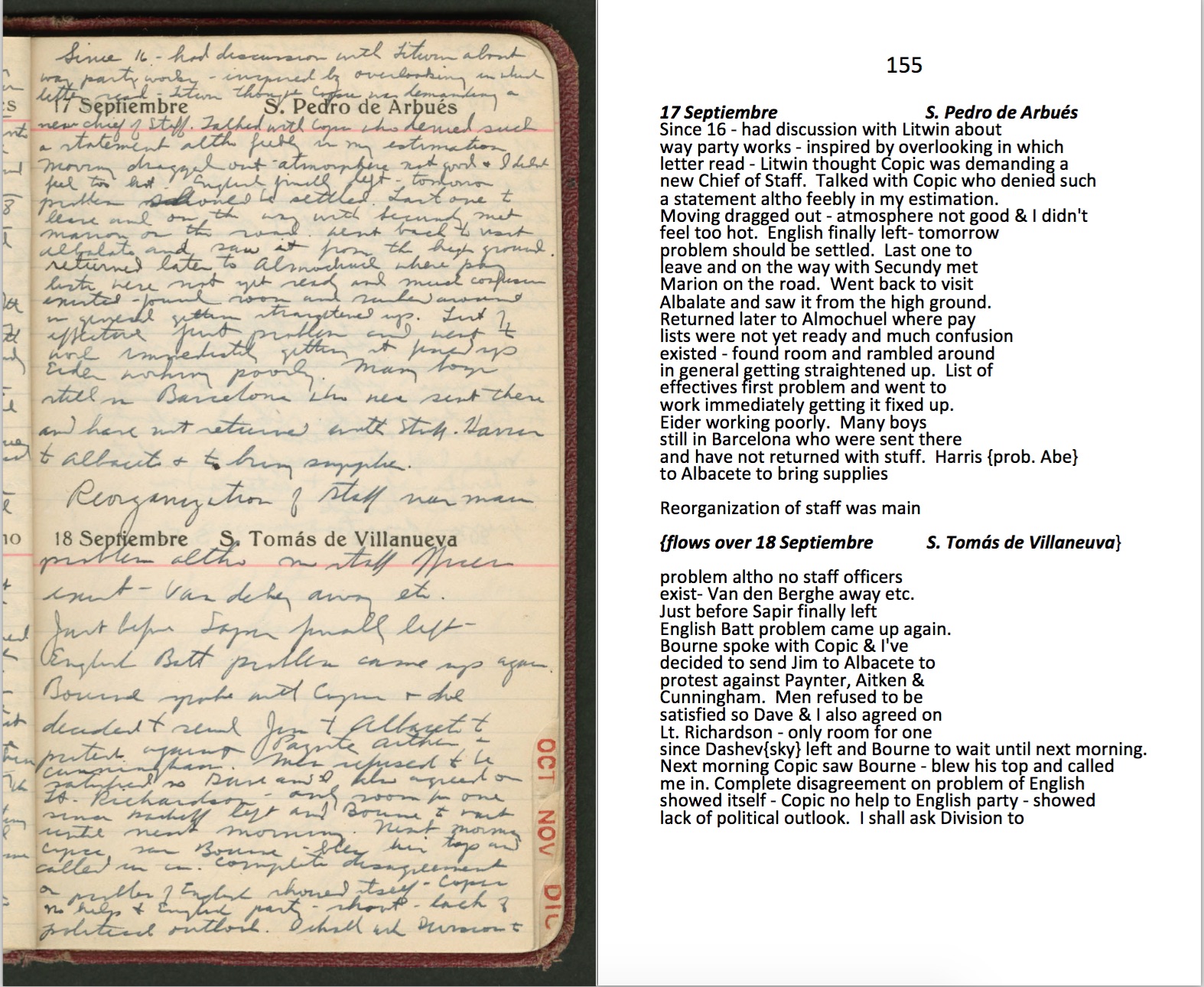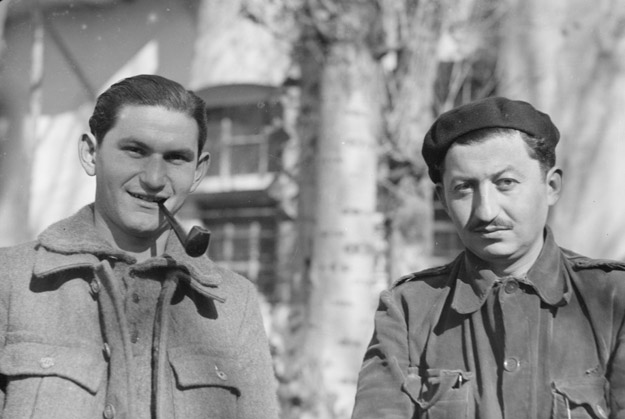
Robert Merriman or Alfred Harvey Litwin read a letter that should probably have been kept private. In it, Litwin interpreted Copic as saying that Merriman would be removed as Chief of Staff. Merriman had not read the memo carefully enough and saw that this could be a conclusion from the memo. Merriman confronted Copic with this and Copic denied it, but not to Merriman’s satisfaction. Copic’s willingness to chew through his staff continues.

Merriman is moving the men back from Albalate to Almochuel. As he said on the 16th, this would be a three day operation by truck since Lou Secundy could only muster a few trucks. The English are gone and Merriman finally moves up in the last truck. He meets Marion Merriman on the road and they have a reunion. Presumably with Marion, he returns to sightsee Albalate. When the Merrimans make it to Almochuel he finds out the paylists are still not straight and he needs to fix them up. Merriman accuses Louis Eider of not working out well. Merriman sends Abe Harris of the Intendencia back to Albacete to bring up supplies. Marion Merriman recalls¹:
Exhausted after the ten full days of fighting at Quinto and Belchite, the brigade was allowed to rest at Azaila. Bob dispatched an urgent note to me: “Dear Girl: I am sending the car and you are to return with it. Our bureau of records work is awful and must be straightened out You must come immediately, without delay. The car cannot wait. I need it and you. Love, Bob.”
I was assigned as a a passenger in a special headquarters car. As we motored north, I passed the hours savoring the thought that soon I would be with Bob again. Eventually we saw signs of the brigade, familiar vehicles, and suddenly we passed Bob’s own car. Each driver recognized what had happened and screeched to a halt on the dusty road.
Bob and I ran to each other. We hugged for a long moment. We couldn’t just stand there in the road, so I joined him in his car. Despite others being with us, I pulled myself close to Bob. As we drove to Azaila and the brigade at rest, I thought: so sweet, so satisfying just to be able to touch my darling again.

Merriman is reorganizing the Brigade Staff but everyone is on leave. The books are a mess. Albacete is refusing to send the payroll until Merriman can get the paylists in order. Merriman pleads that they were just in a battle and he couldn’t have been expected to do paperwork, but Albacete is putting the squeeze on any way they can to force Copic to give up the Dimitrovs and Merriman is the man in the middle. Van den Berg is away (being sent to Albacete to deal with the Dimitrov Battalion placement) and Sapir is in Valencia dealing with Copic’s letter to the Party. Jim Bourne is in Almochuel and it falls to him to go back to Albacete to state the Brigade position on repatriation of the British Battalion. At this point, the British thought they would be following Wally Paynter, George Aitken and Jock Cunningham home. In tapes at the International War Museum in London, Fred Coleman, Bob Cooney and Peter Kerrigan also discuss the British recall to London.² A Central Committee meeting of the Party is held to discuss who should return to England and who should stay in Spain. Merriman implies that Harry Pollitt, head of the British Communist Party, needs help at this point in settling down the British Battalion and supporting his decisions about who will stay and who will go, but instead Copic deals with the issue as he normally does, without tact. Both Pollitt and Bill Rust from England will arrive in late 1937 to deal with the morale issues amongst the Britons. In the London meeting, Aitken and Cunningham are told they won’t return to Spain. There are accusations of some of the British leaders trying to make names for themselves in Spain and in Copeman’s words, “Jock just came apart. He broke down”. Kerrigan would later say that within a year, Cunningham took to the road, tramping, and many years later he met him and he had been in and out of mental institutions. Copeman and Tapsell would return to Spain along with Cooney and a contingent of about 400 new recruits. This would be the nearly last supply of Britons to Spain as recruitment in England was stopped because of the cost of lives to the British Party. The rebellion in the British ranks was as (or more) severe than it was for the Americans after Belchite. Copic had no sympathy for the problem of the English speaking Brigade and probably made Merriman’s job more difficult in settling down the troops.
Two names arise here… Lieutenant Richardson and a “Dasheff” who may be Morris Dashevsky who was wounded in Belchite. We are not sure of the relationship of these men to the discussion of the British Battalion. Richardson may have been promoted within the 57th Battalion. Both would return home in the fall of 1937, so perhaps they were two who were chosen for repatriation in order to provide some relief in the pressure Merriman was facing.
_____________________________
¹ Marion Merriman and Warren Lerude, “American Commander in Spain”, University of Nevada Press, Reno, 1986, pg 167.
² Imperial War Museum, Audio Archives. http://www.iwm.org.uk/collections/
